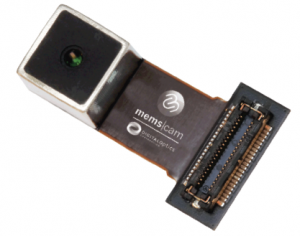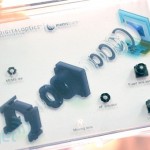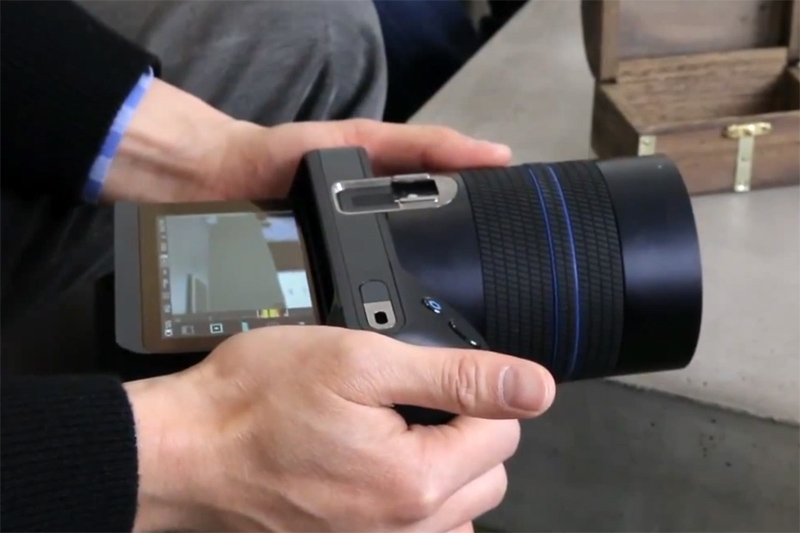Mems|Cam: Software Refocus for Smartphones without LightField Technology
 Ever since their first appearance in the News, Lytro’s most prominent LightField feature was software refocus. The ability to take a picture, and set and change focus after the fact has inspired many of us.
Ever since their first appearance in the News, Lytro’s most prominent LightField feature was software refocus. The ability to take a picture, and set and change focus after the fact has inspired many of us.
While Toshiba is working hard on commercializing that same LightField technology for use in smartphones, California-based company DigitalOptics is taking a shortcut with similar results:
Instead of taking a single photo through a microlens array, DigitalOptics’ Mems|Cam takes a series of pictures at different focus distances. After stitching the photo sequence together, the resulting pictures can be refocused just like Lytro’s LightField pictures.
That being said, there are some distinct differences between Lytro’s and DigitalOptics’ methods:
- Lytro uses LightField technology, which enables many other features such as single-lens 3D, variable depth of field and depth scaling. Mems|Cam is likely limited to refocus.
- DigitalOptics’ camera module allows for full sensor resolution, i.e. 8-13 megapixel photos, while being so small it will easily fit inside today’s smartphones.
- For flawless refocus results, Mems|Cam requires very steady positioning and non-moving subjects.
 Mems|Cam utilizes a new type of camera technology, called “micro-electro-mechanical silicone system”. MEMS makes camera modules significantly thinner, lighter and faster, all while dropping energy use to 1 (one!) percent of traditional camera sensors. Besides refocusable pictures, the camera also boosts extremely fast focus (10 ms instead of the usual 20-25 ms) and facial recognition.
Mems|Cam utilizes a new type of camera technology, called “micro-electro-mechanical silicone system”. MEMS makes camera modules significantly thinner, lighter and faster, all while dropping energy use to 1 (one!) percent of traditional camera sensors. Besides refocusable pictures, the camera also boosts extremely fast focus (10 ms instead of the usual 20-25 ms) and facial recognition.
According to DigitalOptics, the new camera module is already ready to ship. While there are no official announcements yet, several companies have reportedly declared interest in using the technology in their products, and the first MEMS-powered smartphones could be released “around mid-year”.
Full press release text below:
DigitalOptics Corporation Launches mems|camTM
SAN JOSE, Calif., Feb.19, 2013 – DigitalOptics Corporation (DigitalOptics or DOCTM), a wholly owned subsidiary of Tessera Technologies, Inc. (Nasdaq: TSRA), today introduced mems|camTM, a microelectromechanical system (MEMS) autofocus camera module for smartphones.
The mems|cam modules harness the performance advantages of MEMS technology to deliver dramatically improved speed, power, and precision in smartphone cameras. DigitalOptics has demonstrated that mems|cam offers significantly faster autofocus, at 1 percent of the power consumption of traditional voice coil motor (VCM) autofocus technology. DOC’s mems|cam components provide micron-level precision for greater focus accuracy, leveraging the benefits of semiconductor processing at major wafer foundries.
“As a 30 year veteran of the mobile industry, I recognize the tremendous opportunity created by smartphone growth and consumer demand for quality imaging,” said John Thode, president of DigitalOptics Corporation. “DOC’s mems|cam modules will provide meaningful camera differentiation that smartphone OEMs want to deliver to consumers.”
The mems|cam modules answer the smartphone industry’s demand for ever sleeker handset designs. The camera module is the primary height constraint for smartphones. DOC’s first mems|cam module (an 8 megapixel, 1/3.2″ format camera) is available in wire bond (COB) and flip chip packages. This module will allow designers to pursue aggressive form factors thanks to its ultra-low z-height of as small as 5.1mm.
DigitalOptics is initially targeting smartphone OEMs in China for its mems|cam modules. “Smartphone OEMs in China are driving innovative new form factors, features, and camera functionality,” said Jim Chapman, SVP sales and marketing at DigitalOptics Corporation. “These OEMs recognize the speed, power, and precision advantages of mems|cam relative to existing VCM camera modules.”
“We have a strategic relationship with DigitalOptics for mems|cam modules, having recognized the potential advantages of implementing a mems|cam module into our handsets,” said Zeng Yuan Qing, vice general manager of Guangdong Oppo Mobile Telecommunications Corp., Ltd, a leading Chinese smartphone OEM. “Our interest in the mems|cam solution builds on our existing relationship with DigitalOptics. We have implemented DOC’s suite of video and still image software products, including the very popular face beautification tools in our Ulike 2 smartphone.” DigitalOptics plans to demonstrate the Ulike 2 at Pepcom MobileFocus and Mobile World Congress in Barcelona later this month.
DigitalOptics has developed an in-form factor demonstration of its mems|cam All-in-One module. The All-in- One is a fully tuned camera incorporating an OmniVision 8835 image sensor and a Fujitsu Semiconductor Milbeaut® ISP. The CK Telecom smartphone used for this demo is based on the new MediaTek 6589 quad- core application processor platform. DOC plans to show this demo at Mobile World Congress. “We worked closely with DOC on the mems|cam All-in-One demo,” said Roy Ho, chairman of CK Telecom. “CKT has a long relationship with DOC, and we value the differentiation provided by the mems|cam module and DOC’s suite of embedded imaging processing applications.”
“We are delighted to work with DigitalOptics by including Fujitsu Semiconductor’s Milbeaut® ISP in the mems|cam All-in-One module,” said Tom Miyake, corporate VP, Fujitsu Semiconductor Limited. “Fujitsu Semiconductor’s Milbeaut® lineup is the world’s leading image signal processor, and enables superior image quality with an abundance of advanced features, several of which are made more efficient by DOC’s unique intellectual property (IP) cores.”
Initial mems|cam sample requests from smartphone customers are being evaluated now. The list price for 10,000 units of the DOC8324 is US$25.00 per module. For more product information please visit www.doc.com.
Safe Harbor Statement
This press release contains forward-looking statements, which are made pursuant to the safe harbor provisions of the Private Securities Litigation Reform Act of 1995. Forward-looking statements involve risks and uncertainties that could cause actual results to differ significantly from those projected, particularly with respect to the characteristics, benefits, features and potential of DOC’s technologies and products, including its mems|cam modules, industry and technology trends, and DOC’s demonstrations of mems|cam modules at Mobile World Congress and Pepcom MobileFocus. Material factors that may cause results to differ from the statements made include the plans or operations relating to Tessera Technologies, Inc.’s (the “Company”) businesses; market or industry conditions; changes in patent laws, regulation or enforcement, or other factors that might affect the Company’s ability to protect or realize the value of its intellectual property; the risk of a decline in demand for semiconductor and camera module products; the expiration of license agreements and the cessation of related royalty income; the failure, inability or refusal of licensees to pay royalties; initiation, delays, setbacks or losses relating to the Company’s intellectual property or intellectual property litigations, or invalidation or limitation of key patents; the timing and results, which are not predictable and may vary in any individual proceeding, of any ICC ruling or award, including in the Amkor arbitration; fluctuations in operating results due to the timing of new license agreements and royalties, or due to legal costs; failure by the industry to use technologies covered by the Company’s patents; the expiration of the Company’s patents; the Company’s ability to successfully complete and integrate acquisitions of businesses, including the integration by DOC of its recently acquired camera module manufacturing facility in Zhuhai, China; the risk of loss of, or decreases in production orders from, customers of acquired businesses; financial and regulatory risks associated with the international nature of the Company’s businesses; failure of the Company’s products to achieve technological feasibility or profitability; failure to successfully commercialize the Company’s products; changes in demand for the products of the Company’s customers; limited opportunities to license technologies and sell products due to high concentration in the markets for semiconductors and related products and camera modules; the impact of competing technologies on the demand for the Company’s technologies and products; failure by DOC to become a vertically integrated camera module supplier; and the reliance on a limited number of suppliers for the components used in the manufacture of DOC products. You are cautioned not to place undue reliance on the forward-looking statements, which speak only as of the date of this release. The Company’s filings with the Securities and Exchange Commission, including its Annual Report on Form 10-K for the year ended Dec. 31, 2011, and its Quarterly Report on Form 10-Q for the quarter ended Sept. 30, 2012, include more information about factors that could affect the Company’s financial results. The Company assumes no obligation to update information contained in this press release. Although this release may remain available on the Company’s website or elsewhere, its continued availability does not indicate that the Company is reaffirming or confirming any of the information contained herein.
About DigitalOptics Corporation
DigitalOptics Corporation (DigitalOptics or DOCTM), a wholly owned subsidiary of Tessera Technologies, Inc. (NASDAQ: TSRA), designs and manufactures innovative imaging systems for smartphones. The company leverages its deep expertise in optics, camera modules, MEMS and image processing to deliver pioneering products that expand the boundaries of smartphone photography. DOC’s mems|cam modules set the standard for camera module speed, size, power consumption, and precision. DigitalOptics is a leader in embedded image enhancement and computational photography algorithms, including its FaceToolsTM, HDR, panorama, multi- focus, and image stabilization products. DOC’s complementary suite of imaging solutions allows smartphone vendors to rapidly incorporate world-class cameras so users always have high-end imaging on hand. DigitalOptics is headquartered in San Jose, California. For more information visit www.doc.com
About Tessera Technologies, Inc.
Tessera Technologies, Inc.(NASDAQ: TSRA) is a holding company with operating subsidiaries in two segments: Intellectual Property and DigitalOptics. Our Intellectual Property segment, managed by Tessera Intellectual Property Corp. generates revenue from manufacturers and other implementers that use our technology. Our DigitalOptics business delivers innovation in imaging systems for smartphones. For more information call 1.408.321.6000 or visit www.tessera.com.
Tessera, the Tessera logo, DOC, the DOC logo, FaceTools, the mems|cam logo, Invensas, and the Invensas logo are trademarks or registered trademarks of affiliated companies of Tessera Technologies, Inc. in the United States and other countries. All other company, brand and product names may be trademarks or registered trademarks of their respective companies.










1 Response